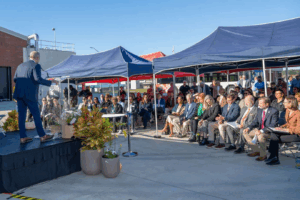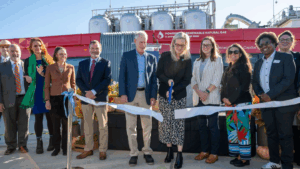By: Paige Starnes, Clean Transportation Intern
Image source: City of Raleigh
On October 15, 2025, the City of Raleigh celebrated the opening of its new Renewable Natural Gas (RNG) facility at the Neuse River Resource Recovery Facility (NRRRF), a major step toward powering city operations with clean, locally produced energy.
Every day, the NRRRF generates roughly 50 million gallons of wastewater. This waste is a risk to the environment when improperly managed, contaminating surface and ground water, leaching into soils, and even infecting drinking water. In the past, methane generated in this process would have been released into the atmosphere. Methane is a powerful greenhouse gas that traps heat in the atmosphere more efficiently than carbon dioxide. In twenty years, methane will absorb 86 times more heat than carbon dioxide. By using organic waste to produce biogas, the methane is reduced through the anaerobic process, displacing fossil fuels, and further reducing emissions. Now with this new facility, the methane is captured and converted into renewable natural gas. The resulting fuel is powerful enough to run more than 70 GoRaleigh buses, turning waste into a resource that helps move residents across the city sustainably.
RNG is a clean alternative to conventional natural gas and can be used in natural gas vehicles. It is created when organic material, such as food waste, livestock residues, or wastewater solids, break down to produce biogas. The gas product of this decomposition is then processed to purity standards. It can be used just like compressed natural gas (CNG) or liquified natural gas (LNG) to fuel transportation services. RNG capture, cleanup, and use in transportation is even more beneficial than CNG as a replacement for diesel fuel. RNG’s decarbonization leads to a net reduction in methane emissions, displacing fossil fuel use.
The new RNG process also helps the city with biosolid management. It reduces the city’s biosolids output by half and creates a soil conditioner. The Bioenergy Recovery Project manages the waste byproducts, or biosolids, and offers a new way to manage them. Whit Wheeler, Raleigh’s Water Director, says, “This project proves that we don’t have to choose between protecting our planet and operating efficiently.” It also allows Raleigh to get closer to their 80% greenhouse gas reduction goal by 2050.
Image Source: City of Raleigh
At the ribbon-cutting event, Steve Kalland, Director of the NC Clean Energy Technology Center said, “Raleigh’s dedication to sustainability and clean transportation serves as an inspiring example for other cities to follow. As part of our technical assistance programs, we at the Center look forward to helping other communities explore opportunities to pursue similar options in their own communities.” With notable cities like Raleigh leading the way, RNG is proving to be a viable solution for both waste management and climate action.


